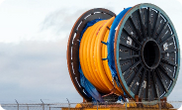Type K vs. Type J Thermocouple Wire: Which One To Buy?
Type K vs. Type J Thermocouple Wire: Which To Buy?

When choosing a thermocouple wire, the most common choice is between Type K and Type J, as they are versatile, equally reliable, and suitable for a larger number of applications than more niche variations of a thermocouple wire. Let's look into the differences between these two most popular types of a thermocouple wire.
In general, type K and Type J thermocouples are similar. However, type K has a greater temperature range, which makes it more versatile. Type J is a more stable thermocouple.
What Is A Type K Thermocouple Wire?
Type K is a thermocouple wire with a temperature range of –270°C to 1260°C (–454 to 2,300 degrees Fahrenheit). The two conductors of this thermocouple are nickel/chromium alloy, known under the name chrome, and nickel/aluminum alloy, or alumel. These materials are non-iron and non-corrosive. One is color-coded in red, and another one in yellow.
Here are the basic characteristics of thermocouple Type K:
- Type K is a cheaper thermocouple wire with excellent oxidation protection. Therefore, type K wire is perfect for use in harsh environments where oxidation is possible, as well as outside.
- Because of its oxidation properties, Type K thermocouple wire lasts longer than Type J thermocouple. Type K is a fast-response type thermocouple, which means it is excellent at measuring the temperatures of surfaces and liquids.
- The stability of K type thermocouple is 2.2°C or ±0.75%. This is a good stability over a wide temperature range. Stability corresponds to the accuracy of the thermocouple wire. The stability of type K is good for a large number of industrial applications. However, it is not enough for the harshest applications.
- Type K thermocouple also has a fast response time of 1-2 seconds, which is faster than type J.
- Faster response times allow the thermocouple to register temperature changes quickly, providing more accurate readings in environments where temperatures fluctuate rapidly.
- Type K and Type J thermocouples are generally in the lower cost range than other types. However, exact costs can vary depending on specific configurations and suppliers.
What Is Type K Thermocouple Used For?
Type K thermocouple wire is commonly used in applications with a temperature rating of 550 °C and above. The maximum operating temperature is 1100 °C. Usually, the applications of a type K thermocouple wire fall into this range. Type K is the most common type of thermocouple wire.
Some of the common applications of Type K are:
- Steel Plants and Iron Plants: Type K thermocouple wires are used to keep track of the temperatures in casting steel and iron.
- Chemical Refineries: to test and regulate temperatures during various chemical processes.
- Petroleum Facilities: to test temperatures in refining and processing petroleum products.
- Nuclear Plants: a type K thermocouple is radiation hardened, which means its susceptibility to radiation impact is lower than other similar materials.
- General Industrial Applications: suitable for use in kilns, ovens, industrial furnaces, gas turbine exhaust, diesel engines, and other high-temperature processes.
- Food Processing: used for temperature monitoring and control, pasteurization, and food items storage.
- Scientific and Medical Labs: used for sterilizing equipment and incubation.
Type K thermocouple wire is not suitable for vacuum-like applications and sulphuric conditions because of the properties of chromel and alumel in these environments. Type K also cannot be used in highly reducing atmospheres with a lack of oxygen because the protective layer of the cable can be compromised there. Thermocouples suitable for reducing environments are Type N Nicrosil/Nisil and Type C Tungsten/Rhenium.
What Is A Type J Thermocouple Wire?
Type J is a general-purpose thermocouple wire with two conductors, one made of iron and another of constantan ( Copper-Nickel ) alloy wire. The temperature range of the cable is -40°C to 750°C because iron cures at a higher point. The positive wire is red, and the negative one is white. It is cheaper than Type K thermocouple wire, though both are in the lower price range than other types of thermocouple grade wire.
- Type J Thermocouple is not suitable for temperatures higher than 750°C due to iron being one of the conductors. Iron is also susceptible to rust.
- Another conductor, constantan, does not do well in oxidization, which makes Type J not suitable for harsh environments.
- Type J thermocouple wire has an accuracy of ±2.2°C or ±0.75%
- It has moderate stability and is quite susceptible to rust and oxidation.
- J Type thermocouple has a moderate response speed of 2-3 seconds.
What Is Type J Thermocouple Used For?
- Vacuum applications: Type J thermocouple can withstand the absence of atmospheric pressure without significant degradation.
- To monitor the temperatures of inert materials that are not highly reactive, like sand, concrete, or asbestos-containing materials.
- Monitoring temperatures and heat treating when manufacturing plastics and resins.
- Other general industrial applications that fit their temperature range.
- Plastic injection molding
- Inert material processing
Type J thermocouple is not used in corrosive, high-temperature, and sulphuric environments. They also have no long-term stability for harsh environments with high humidity, abrasive conditions, and highly corrosive chemicals.
All Thermocouple Wires Compared
Below is the table comparing all types of thermocouples on the market to put Type K and Type J cables in the general context:

Type K Thermocouple vs. Type J Thermocouple: The Bottom Line

Type K thermocouple wire and Type J thermocouple wire are both versatile, reliable, and cheap types of thermocouples, but their applications do not overlap as often as you might think.
Here are the key differences between the two:
- Type K has a wider temperature range than type J.
- Type K has better oxidation properties than Type J.
- Type J has higher sensitivity in the lower temperature range
- Type J performs better in vacuum-like applications.
- Type J is used to manufacture lower-temperature materials like plastics and resins.
General advice is to use type K Thermocouple cable in high-temperature applications, corrosive environments, and applications where the cable is prone to oxidation. This includes damp applications and the ones that are submerged in water. Type J cable is your best bet in lower temperatures, as its temperature range starts at -40°C. It is also perfect for vacuum applications. In all other applications that do not precisely match these criteria, both Type K and Type J thermocouple wires can be used as long as their temperature range is met.
When choosing a thermocouple, always consider how temperature range, sensor resistance, and response time fit the particular application.
For thermocouple grade and thermocouple extension cables, visit Nassau National Cable.


















